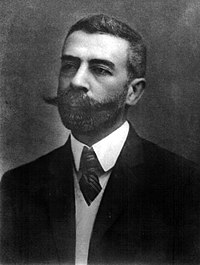Joaquín Victor González ( Spanish: Joaquín Víctor González ; March 6, 1863 , Chilecito , La Rioja Province , Argentina - December 23, 1923 , Buenos Aires , Argentina ) - Argentine lawyer, historian, educator and statesman, Minister for Foreign Affairs of Argentina (1902 and 1903).
| Joaquin Victor Gonzalez | |||||||
|---|---|---|---|---|---|---|---|
| Joaquín Víctor González | |||||||
 | |||||||
| |||||||
| Predecessor | Luis Maria Drago | ||||||
| Successor | Jose Antonio Terry | ||||||
| |||||||
| Predecessor | Amancio Alkorta | ||||||
| Successor | Luis Maria Drago | ||||||
| Birth | March 6, 1863 Chilecito , La Rioja Province , Argentina | ||||||
| Death | December 23, 1923 (60 years) Buenos Aires , Argentina | ||||||
| The consignment | National Party of Autonomists | ||||||
| Education | National University of Cordoba | ||||||
| Profession | lawyer | ||||||
| Religion | Catholic | ||||||
| Place of work | |||||||
Biography
He graduated from the Law Faculty of the National University of Cordoba .
In 1887, as one of the most famous lawyers in Argentina, he was appointed a member of the Constitutional Review Commission and was entrusted with the task of drafting a constitution for the province of La Rioja. In the same year, he published his first historiographic work, The Revolution for the Independence of Argentina, and was appointed Professor of the Law Department.
In 1889-1901 - Governor of the province of La Rioja. After retiring, he devoted himself to literary and journalistic activities. In his work “National traditions” he tried to link together the geographical features of the country, its folklore, sociology and history. In 1894, he heads the Department of Law, and in 1896, he is a member of the National Council for Education, and is also a senior fellow at the Faculty of Arts at the University of Buenos Aires.
In 1898-1901 elected a deputy to the Chamber of Deputies of the National Congress of Argentina.
In 1901, he was appointed by President Julio Roca the Minister of the Interior of Argentina. At the same time, he becomes Acting Minister of Justice, Public Education and Foreign Affairs. Conducted a reform of the electoral law, which provided for the holding of elections by the majority system. However, he continued his teaching activities at the Faculty of Law of the University of Buenos Aires. He adhered to extremely conservative views, when he was once asked what he thought about universal suffrage, he replied: "This is a triumph of universal ignorance!"
In 1903, he served briefly as Minister of Foreign Affairs, and from 1904 to 1906. served as Minister of Justice and Public Institutions of Argentina. In this post, he initiated the creation of a pedagogical seminary, later called the National Pedagogical Institute of Buenos Aires, which had a large staff of foreign teachers, mainly from Germany, and who now bears his name. The following year, created the modern University of La Plata. In 1906, he was appointed to the post of president of this university, which he held until 1918.
Back in Buenos Aires, he again began teaching in the areas of American constitutional law, public institutions and the history of Argentine diplomacy. In 1916 he was elected senator from the province of La Rioja, he held this position until his death in December 1923.
From 1906 he was also a member of the Royal Spanish Academy of Philology, and from 1921 he was a member of the Permanent International Arbitration Court in The Hague.
It was part of the Masonic Lodge.